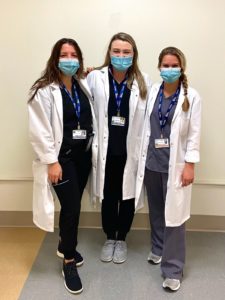Over the past 6 months, great strides have been made in providing early intervention speech therapy in using teletherapy. Lessons learned in teletherapy have been abundant.
Speech-language pathologists Megan Almeda and Jacqueline Pfeiffer of SLP Communication Foundations have collaborated to share lessons they have learned while continuing to provide the highest level of early intervention speech therapy to the youngsters whom they treat.
Megan: “It is important to make time at the beginning of the day for either mindfulness, an outdoor walk, a workout, or something else that helps you to relax your mind and move your body before or after working in front of a screen all day. This should be something implemented in everyone’s daily routines even when teletherapy isn’t the main mode of therapy because it keeps you happy, healthy, and better balanced.
Jackie: “The child’s goals still remain the same, just the delivery approach will change through a new method. The therapist will still be able to work towards the same goals, but through a parent-coaching model of in-home speech therapy. Parents get to take on the role of the therapist, as they are no longer just watching and then modeling. Parents need to be fully hands-on in sessions, which is extremely helpful for carrying over goals. Speech Therapists coach the parents to implement strategies and provide guidance to ensure they are teaching effectively. This leaves the parents feeling more confident & empowered to carryover strategies throughout the week.”
Megan: “Every child is unique, therefore so is every telehealth session. One child may excel with screen share activities, green screens, and interactive videos. Another child may benefit more from the provider modeling and engaging the child in interaction with puppets, balloons, and other props. Some children do their best when a parent is given an activity idea(s) prior to the session to set up in their own environment. It is so important for SLPs to adapt to each child and family’s specific needs.”
Jackie: “It is important to keep the time and place of therapy consistent. Picking a specific time of day and location for sessions can help create routines and avoid distractions when in the home therapy setting. The therapist and parents can work together to find the best learning environment in the house to eliminate disruptions. It is important to think about the child’s needs. Can the child sit at the table for the entire session? Will they need to take sensory breaks? The child might only be able to sit for a short amount of time and then need to get up and move. Coming up with a time of day, place, and plan will help create successful sessions via teletherapy.”
If you have been considering early intervention speech therapy for your child but have been hesitant due to the pandemic, give us a call. We are glad to be a resource to you.
Headquartered in Dutchess County, Language Fundamentals & SLP Communication Foundations provides early intervention speech therapy in Dutchess County in multiple counties of New York State.
About the authors:
Megan Almeda, M.Ed. CCC-SLP earned her B.S.Ed. in Communication Sciences and Disorders and M.Ed. in Speech-Language Pathology from the University of Virginia. Megan provides Early Intervention Speech Therapy services to children ages 0-3 within Dutchess county.
Jacqueline Pfeiffer, M.S. CCC-SLP earned her B.S. in Psychology at The State University of New York College at Oneonta and M.S. in Speech-Language Pathology from Sacred Heart University. Jacqueline provides Early Intervention Speech Therapy Services to children ages 0-3 in Westchester County.




Hi there friends, its impressive article regarding cultureand fully explained, keep it
up all the time.